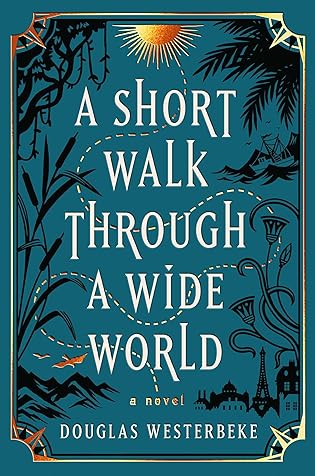 A Short Walk Through a Wide World by Douglas Westerbeke
A Short Walk Through a Wide World by Douglas Westerbeke Format: eARC
Source: supplied by publisher via Edelweiss
Formats available: hardcover, large print, paperback, ebook, audiobook
Genres: historical fantasy, magical realism, literary fiction
Pages: 399
Published by Avid Reader Press / Simon & Schuster on April 2, 2024
Purchasing Info: Author's Website, Publisher's Website, Amazon, Barnes & Noble, Kobo, Bookshop.org, Better World Books
Goodreads
The Invisible Life of Addie LaRue meets Life of Pi in this dazzlingly epic debut that charts the incredible, adventurous life of one woman as she journeys the globe trying to outrun a mysterious curse that will destroy her if she stops moving.
Paris, 1885: Aubry Tourvel, a spoiled and stubborn nine-year-old girl, comes across a wooden puzzle ball on her walk home from school. She tosses it over the fence, only to find it in her backpack that evening. Days later, at the family dinner table, she starts to bleed to death.
When medical treatment only makes her worse, she flees to the outskirts of the city, where she realizes that it is this very act of movement that keeps her alive. So begins her lifelong journey on the run from her condition, which won’t allow her to stay anywhere for longer than a few days nor return to a place where she’s already been.
From the scorched dunes of the Calashino Sand Sea to the snow-packed peaks of the Himalayas; from a bottomless well in a Parisian courtyard, to the shelves of an infinite underground library, we follow Aubry as she learns what it takes to survive and ultimately, to truly live. But the longer Aubry wanders and the more desperate she is to share her life with others, the clearer it becomes that the world she travels through may not be quite the same as everyone else’s...
Fiercely independent and hopeful, yet full of longing, Aubry Tourvel is an unforgettable character fighting her way through a world of wonders to find a place she can call home. A spellbinding and inspiring story about discovering meaning in a life that seems otherwise impossible, A Short Walk Through a Wide World reminds us that it’s not the destination, but rather the journey—no matter how long it lasts—that makes us who we are.
My Review:
The title is only half right. The world that Aubry Tourvel walks through is indeed wide, but her walk is far, far from short – especially from her own perspective.
That walk begins in 1885, when Aubry is all of 9 years old, the protected and spoiled youngest child of middle-class parents in Paris, France. Whether her condition is caused by a mysterious puzzle ball, her unwillingness to sacrifice it, or merely the whims of fate is never 100% certain – and it doesn’t need to be.
However the malady, or perhaps curse is a better term, was visited upon her, nevertheless one evening Aubry sits down at the dinner table and starts bleeding from seemingly every orifice while going into convulsions that wrack her entire body.
Medical science has neither diagnosis nor cure. All Aubry has to go by, on, for, and with, is her meager experience that when she changes location she immediately starts to heal, but when she stays in the same place for too long, the blood starts dripping out of her nose and her condition takes over.
Fast, hard and with extreme pain in every limb.
So Aubry is off, and so is the story. At first, with her whole family, moving from hôtel to hôtel in the suburbs of Paris, but then, as she runs out of places she hasn’t been yet, out into the countryside with her mother, Aubry’s knowledge of her mother’s utter exhaustion and total depression, and her awareness of her family’s dwindling finances.
Aubry runs away and leaves her mother behind. She’s all alone, walking that wide, wide world, at the age of twelve.
This is her story. It’s not exactly an adventure, although there are certainly adventures within it. It’s absolutely a story about the journey and not the destination, because as far as Aubry can discover, the only destination is death.
But along the way, for as many steps and as much time as Aubry has, there’s an ever-changing, always moving, and utterly fascinating life.
Escape Rating A: If you could put Journey to the Center of the Earth and Around the World in 80 Days, both by Jules Verne and both still fairly new when Aubry begins her walk, into a book blender, you’d get at least the basic broth of Aubry’s long journey. A broth spiced with a bit of Nnedi Okorafor’s Remote Control.
The difference is that both of those classic stories are ‘there and back again’ adventures. The protagonists set out with every expectation that they will return home at the end, more or less safe and sound.
Aubry can neither go home, nor can she make a new one. She’s a human turtle, carrying her home on her back. And it’s HARD. It’s a hardness that both does and does not define her, and that’s what makes her journey so compelling to follow.
On the one hand, she has to be as self-sufficient as possible, because she knows that she will often be utterly alone, not because she wants to be, but because she travels through many of the empty places of the world, frequently on paths that no one else can see. At the same time, she learns that when she does find companions, the only thing she has to trade is her ability to use her self-sufficiency to help others.
But what keeps the reader with her is the emotional journey. She goes from spoiled to über capable. She goes from being done for to doing for others when possible and whatever is necessary to survive all the time.
And she goes from child to young woman to middle-aged and to elderly – one step at a time and always with the monkey of her condition on her back. She makes friends and loses them and drinks from all the springs of the world – but only to the shallowness of a teaspoon.
She samples but never stays. And we’re right there with her.
This is a story that grabbed me from the first page with the sheer puzzle of it. The idea of her endless journey, and even more fascinating still, the progress of it in a world where all the corners had not yet been filled in.
And that it was a woman’s journey and not a man’s. There were (and are) plenty of such journeys undertaken by men in fiction. When Aubry sets out, it was the age of such stories, often written by Jules Verne and H.G. Wells. Their tales often told stories of ‘big’ adventures of one sort or another.
Instead, Aubry’s journey is long rather than ‘big’. She’s not trying to become famous – although she does. She’s trying to survive and that gives her story a much different flavor and leads it towards a more authentic conclusion. In the end, as much as we may envy her ability to pick up stakes and travel, to make herself comfortable wherever she goes, we feel for her inability to ever take a break from it.
So, if you’re ever feeling like home is a bit too comfortable to ever leave, take A Short Walk Through a Wide World with Aubry Tourvel and travel by armchair with gratitude for the ability to take that walk with her without having to leave everything behind, and see the world from the perspective of someone else’s aching feet.

 Space Holes (First Transmission, #1) by
Space Holes (First Transmission, #1) by 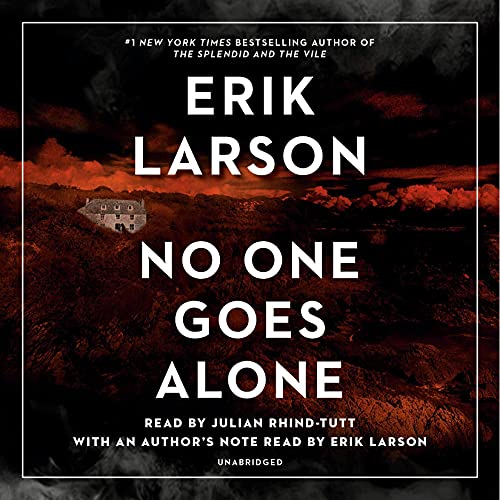 No One Goes Alone by
No One Goes Alone by  The House on Widows Hill (Ishmael Jones #9) by
The House on Widows Hill (Ishmael Jones #9) by  The House on Widows Hill is more of a twist on the typical English country house mystery than even Ishmael Jones and his partner Penny Belcourt usually have to contend with.
The House on Widows Hill is more of a twist on the typical English country house mystery than even Ishmael Jones and his partner Penny Belcourt usually have to contend with.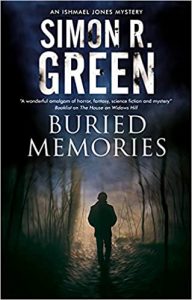 Someone in the ‘Organization’ is considering buying the place – or that’s what Ishmael and Penny are told, anyway. That night is a ‘one-night-only’ invitation to not just Ishmael and Penny as representatives of the potential buyer, but also to a whole team of “ghost botherers” (as Ishmael calls them) who have been begging – for years it seems – to get inside the old haunt. Along with one intrepid reporter who represents the family that owns the creepy pile – and really would like to get shed of the place once and for all.
Someone in the ‘Organization’ is considering buying the place – or that’s what Ishmael and Penny are told, anyway. That night is a ‘one-night-only’ invitation to not just Ishmael and Penny as representatives of the potential buyer, but also to a whole team of “ghost botherers” (as Ishmael calls them) who have been begging – for years it seems – to get inside the old haunt. Along with one intrepid reporter who represents the family that owns the creepy pile – and really would like to get shed of the place once and for all. Escape Rating A-: I normally save this series for around Halloween, but I’m in the midst of a reading quandary that I hoped this book would solve – or at least beat back for a couple of days. I’m in the middle of listening to Erik Larson’s
Escape Rating A-: I normally save this series for around Halloween, but I’m in the midst of a reading quandary that I hoped this book would solve – or at least beat back for a couple of days. I’m in the middle of listening to Erik Larson’s 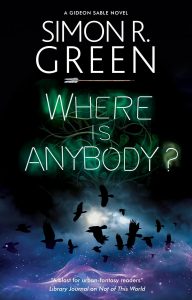 The House on Widows Hill very much has the classic haunted house vibe going on – even though with Ishmael and Penny involved the reader begins the story aware that it just isn’t going to go to any of the places that haunted houses normally go. That Ishmael gets shaken out of some of his internal certainties and securities added a bit to the ongoing arc of the series while at the same time ramping up the tension of both this book and the books in the series yet to come.
The House on Widows Hill very much has the classic haunted house vibe going on – even though with Ishmael and Penny involved the reader begins the story aware that it just isn’t going to go to any of the places that haunted houses normally go. That Ishmael gets shaken out of some of his internal certainties and securities added a bit to the ongoing arc of the series while at the same time ramping up the tension of both this book and the books in the series yet to come.

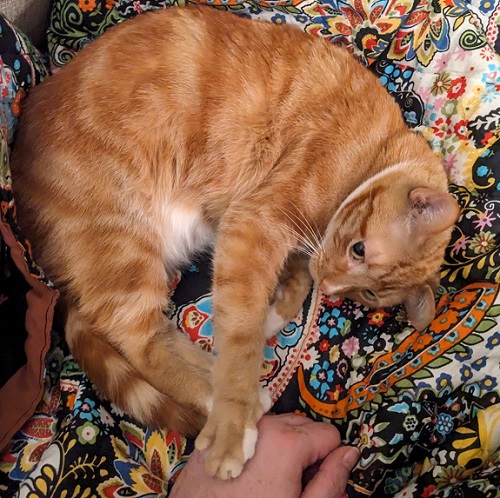
 Current Giveaways:
Current Giveaways: Blog Recap:
Blog Recap: Coming This Week:
Coming This Week:





























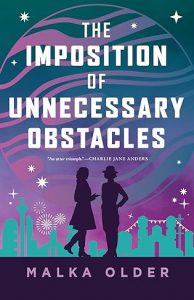
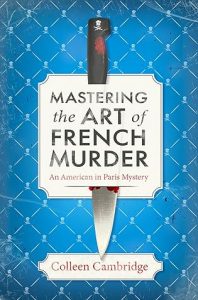



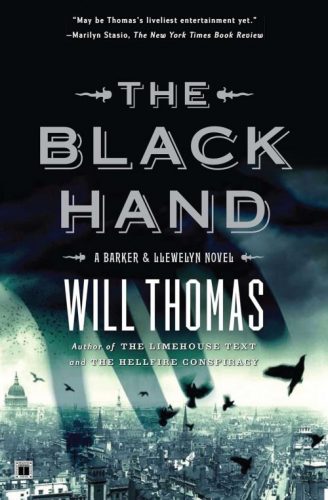 The Black Hand (Barker & Llewelyn, #5) by
The Black Hand (Barker & Llewelyn, #5) by  So far, at least, the
So far, at least, the  Last but not least there’s the resonance to the now in this story that is very much steeped in the ‘then’. Because while the case may be about the Mafia, what’s behind their advent into London is a debate about immigration and immigrants and just how easy or difficult it should be and just how much enforcement is necessary and which way and upon whom the economic impacts have and will fall.
Last but not least there’s the resonance to the now in this story that is very much steeped in the ‘then’. Because while the case may be about the Mafia, what’s behind their advent into London is a debate about immigration and immigrants and just how easy or difficult it should be and just how much enforcement is necessary and which way and upon whom the economic impacts have and will fall. Because I’ve enjoyed this series so much so far, it was an obvious choice for one of this week’s Blogo-Birthday giveaways – especially as the latest book in the series,
Because I’ve enjoyed this series so much so far, it was an obvious choice for one of this week’s Blogo-Birthday giveaways – especially as the latest book in the series,  A Body at the Dance Hall (London Ladies' Murder Club #3) by
A Body at the Dance Hall (London Ladies' Murder Club #3) by  But trouble finds Mabel, as it has in her previous adventures,
But trouble finds Mabel, as it has in her previous adventures,  Escape Rating A-: I’ve already reached the point in Mabel’s adventures where I’m here specifically for her, and the particular case she’s working on is just extra. A compelling extra in the case of A Body at the Dance Hall, but still extra. I’m here to see how Mabel and her friends are doing, and to watch as she learns more about London, her assigned jobs for the Useful Women Agency, and the progress of her romance with her neighbor, Park Winstone. I’m especially here for the way that she keeps learning how to be a good investigator as well as an independent woman, a good worker and a good friend.
Escape Rating A-: I’ve already reached the point in Mabel’s adventures where I’m here specifically for her, and the particular case she’s working on is just extra. A compelling extra in the case of A Body at the Dance Hall, but still extra. I’m here to see how Mabel and her friends are doing, and to watch as she learns more about London, her assigned jobs for the Useful Women Agency, and the progress of her romance with her neighbor, Park Winstone. I’m especially here for the way that she keeps learning how to be a good investigator as well as an independent woman, a good worker and a good friend. All of which means that in the middle of her assignment to show Roxanne the sights of London, Mabel also has a ringside seat on the behavior of Roxy, her father and stepmother, her mother when she arrives from America very much like the avatar of DOOM in T. Kingfisher’s
All of which means that in the middle of her assignment to show Roxanne the sights of London, Mabel also has a ringside seat on the behavior of Roxy, her father and stepmother, her mother when she arrives from America very much like the avatar of DOOM in T. Kingfisher’s